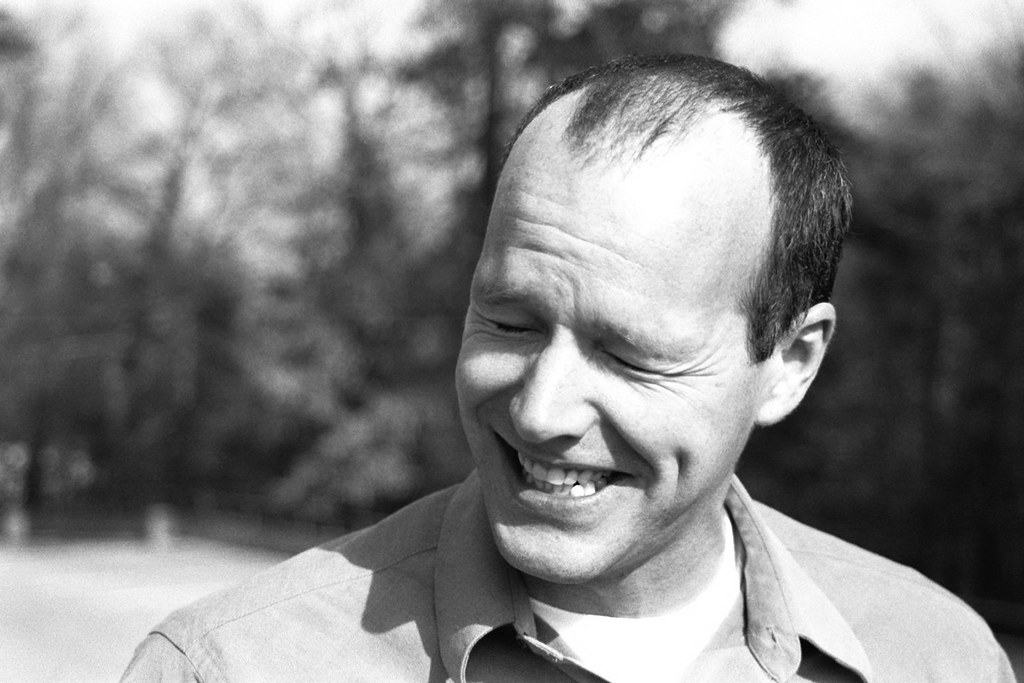Old Introductions: Lisa Jarnot & Andrea Selch
5. “With a chainsaw, my girlfriend is Evel Knievel,” writes Andrea Selch in a line that exemplifies the blend of worlds that Selch’s poems distill into a solution: the worlds of domesticity and motherhood, a world of lesbian relationships and identity, the world of American entrepreneurism, pop culture, and personal and public histories. Through all these worlds the narrator is guided by desire, by passion: she writes, “Oh you honey dew / come back soon. Who cares / if it’s true but while it’s new / I’d rather my two hands / were full of you.”
6. In the not so regular world of the day to day, Selch serves as the president of Durham’s Carolina Wren Press, is a mother of two, is fluent in at least two languages, and recently returned from Philadelphia where she gave a reading with poets Erica Hunt & Evie Shockley at the Kelly Writers’ House. She earned a PhD from Duke University for her thesis on a period in the early 20th century when national radio networks kept poets on salary. The author of the chapbook Succory, Selch’s first full length collection of poems, Startling, was released last fall.
7. It is to changes in Selch’s worlds that the poems’ eye is drawn. In “The Lithuanians” she sketches the shifting passions of several generations within a family. She writes of the older generation, “It was Paris where these two exchanged vows. / And afterwards, raw oysters in their stomaches and drunk on champagne, / doctor and doctor walked the Champs Elysees / and talked of buying art.” After following this couple through their lives on the Upper East Side, the poem ends “Now, instead of quartets and Grade-A beef, / the table is set with peanut butter sandwiches, buffet style.”
8. In “Christmas at Home,” she writes, “I used to be the butch one, but now / she lifts whole oaks and splits them with one blow.” And lastly in “1979: Tearing Down the Morris House on Perth Avenue” she writes of the startling evolution of a family home into a monastery into a building waiting for destruction: “In the wet bar stands a marble altar and walnut kneeler; / the gown room's been a dormitory; the closets, vestiaries.”
9. Throughout these changes her poems locate and search for a place of stability, connection. She writes of another mother’s visits: “every afternoon / they come here: five slender gray ones, / coffee muzzles, white tails twitching. / The two who just two months ago were fawns / dare to nibble on the lawn”, and a home decorated for the winter: “the front door creaks under garlands and wreaths. / This year we won’t brave the river or cross the woods.” And finally in “First Words to My Son” she writes, “here, let me take the bannister, / study each stair: Let nothing disturb you / nor ruffle a single russet hair.”
10. Please welcome Andrea Selch.
11. “I am barbecuing eucalyptus pigs of hills and brightly colored housetops, I am waiting for my senses to come back, I am a cabbalistic moment all in black, I am your drunken Irish brother and the plantains on the lawn, I am the tourists hoarding sharks teeth, I am the empty grain silos of Bernal Heights and god, and I am you on the back of a motorcycle crossing Dolores in the pineapple groves of Elvis Costello, sleeping all night, inside the artificialist lagoons, beyond the palm trees, I am a drag queen named Heather not quite ready for New York.”
12. I am Ken Rumble, and I am introducing you to Lisa Jarnot.
13. “I will make you understand, I, being who I am will make you understand who I am, on a Sunday.”
14. This Lisa Jarnot is the same Lisa Jarnot who wrote a poem called “Lisa Jarnot.” This is the Lisa Jarnot who wrote three books – Some Other Kind of Mission, Ring of Fire, and Black Dog Songs – all by Lisa Jarnot.
15. “You, armadillo, the dark and stately shape of armadillo, the street the shape of armadillo.”
16. “I am traveling to edges made of night, I am not sure where I am and I am traveling to edges made of rock in the avocado night, I am traveling to the edges to the plane to where I am to cross the parking lot to stand upon the median to edges made of rock in avocado night.”
17. This Lisa Jarnot is knitting hats – she is not knitting hats now – she is knitting hats, one each to commemorate each US soldier killed in Iraq. Lisa Jarnot is sitting in this room and uses her web log which is sitting in cybespace to protest the conflict in Iraq and Afghanistan and the current administration, the Lisa Jarnot who wrote the poem “Swamp Formalism” for Donald Rumsfeld who has received several letters from Lisa Jarnot.
18. “As if they were not men, / amphibious, gill-like, with / wings, as if they were / sunning on the rocks, in a / new day with their flickered / lizard tongues.”
19. And for Dick Cheney, “Dumb Duke Death”
20. “chimp chore / damp dank / death do / dead deal / duck”
21. The poems written by Lisa Jarnot take small moments -- mammal moments, bird moments, love moments – moments Lisa Jarnot has seen, read, and heard about, takes these moments and peels them like an artichoke, peels moments and words and mammals and things like artichokes because there are so many things and artichokes and words and mammals and words like everything mean everything.
22. “They lover to go on unmistaken, that they loved to not to be gratuitous or cry, that they loved the fortitude of yaks, that suddenly they loved the whiskey and the sunlight and the key, that they loved the corn cow and the cow corn that it ate, that they loved the cat food as it rolled across the floor … that they knew they loved the river that was made where people dream.”
23. An agoraphobic writer named Robyn Taylor is not Lisa Jarnot, but Lisa Jarnot pretended to be Robyn in the award winning film The Time We Killed directed by Jennifer Reeves about the days in New York after September 11th. Robyn says in that film, “Terrorism got me out of the house, the war on terror drove me back in.”
24. The following lines written by Lisa Jarnot sum up some ideas of Lisa Jarnot: “In this most perfect rhyme / that takes up what it sees, / with perfect shelter from the / rain as perfect as can be … in these most perfect habits / of the waving of the trees, / through this imperfect language / rides a perfect brilliancy.”
25. I am Ken Rumble and I am asking you to please welcome Lisa Jarnot.



0 Comments:
Post a Comment
<< Home